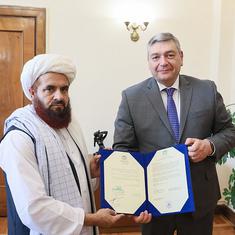The Assam government is set to deport seven Myanmarese nationals who are lodged in a detention camp in Silchar in the state’s Cachar district this week. The move has sparked a controversy, not least because the Supreme Court is hearing a petition to stop the Centre from deporting Rohingya Muslims who have sought refugee in this country after fleeing religious persecution in Myanmar.
It is not known if the seven people Assam is deporting are Rohingya. Lakshmanan S, collector of Cachar, refused to divulge their ethnic background even as he said there were several Rohingya in the Silchar camp. He could not discuss their “specifics”, he claimed.
Rakesh Roushan, Cachar’s police chief, said he was not authorised to comment on the matter.
Multiple news reports, however, quoted unidentified sources in Cachar as saying the people being deported are all Rohingya Muslim refugees. They would be pushed into Myanmar on October 4 from Moreh, a border town in Manipur, the reports said, adding they all had completed prison sentences after being convicted of staying illegally in violating of laws such as the Passport Act and Foreigners Act. News agency AFP quoted unidentified United Nations officials saying that the seven men belong to Kyauk Daw township in central Rakhine but mentioned the date of deportation as October 3.
“This is in complete violation of the judicial process given that a petition on the same is being heard by the Supreme Court,” said the advocate Prashant Bhushan, who filed the petition on behalf of two Rohingya Muslims in 2017.
India does not have a law on refugees. “But in 2011, the Centre had circulated a standard operating procedure to all states and Union territories for dealing with refugees,” said a senior official in the Union home ministry who asked not to be identified. “The standard operating procedure stipulates that cases that are prima facie justified on grounds of fear of persecution due to race, ethnic identity, religion, gender, political opinion, or membership of a social group can be recommended by the state government or Union territory to the home ministry for a long-term visa.”
Granting refuge to the Rohingya could easily be justified on the ground of fear of persecution, the official noted, but the majority of them had fled their homeland without any valid papers – a situation the standard operating procedure is silent about.
Charged legal battle
The Rohingya are an ethic Muslim minority from Rakhine state of Myanmar who have faced persecution in their predominantly Buddhist nation for around four decades now. They have settled as refugees, mostly in Bangladesh but also in Malaysia, Thailand, India, Pakistan, and the Gulf countries.
Nearly a million Rohingya are estimated to have fled their homes, especially after Myanmar launched a fresh military crackdown in Rakhine in 2017 in the garb of fighting extremist groups.
In India, around 20,000 Rohingya have been registered as refugees by the United Nations, but they face hostility, from both society and the state. In August 2017, Minister of State for Home Kiran Rijiju declared: “As far as we are concerned they are all illegal immigrants. They have no basis to live here. Anybody who is illegal migrant will be deported.”
Since the Supreme Court admitted Bhushan’s plea calling the proposed deportation unconstitutional in September last year, the Centre has submitted multiple affidavits stating the Rohingya could not be allowed to come or live in India because they posed a “threat to the security of the nation”. The affidavits also argued that India was not a signatory to the 1951 United Nations Convention relating to the Status of Refugees or the Protocol of 1967 which bind their signatories to the principle of non-refoulment
The principle of non-refoulment protects refugees and asylum seekers from being forced to return to where their lives are likely to be at risk.
The petitioners, though, had argued that India was a signatory to other international conventions that bind it to the principle of non-refoulment.
The principle is part of customary international law, which refers to obligations arising from established state practice. India can recognise the principle without signing or ratify the United Nations conventions but it will first have to amend existing domestic laws such as the Foreigners Act, which applies to refugees by default in the absence of a specific law.
In June, meanwhile, Myanmar signed an agreement with the United Nations to “start working on creating conditions which could be conducive to the voluntary return of refugees from Bangladesh”. There has been no such deal with India though.










